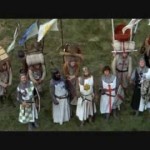We run our website the way we wished the whole internet worked: we provide high quality original content with no ads. We are funded solely by your direct support. Please consider supporting this project.
What is the significance of Deuteronomy 9:13–14, 18–20, 25?
The Lord tells Moses “Let me alone that I may destroy them [the Israelites] and blot out their name from under heaven…” (vs. 14). Moses later says to the Israelites, “the Lord intended to destroy you” (vs. 25). Moses interceded for forty days and then tells the Israelites, “the Lord listened to me…” (vs. 19). So too, “the Lord was so angry with Aaron that he was ready to destroy him, but [Moses] interceded also on behalf of Aaron at the same time” (vs. 20) and Aaron was spared.
If the future is exhaustively settled and known by God as such, the integrity of Scripture’s account of God’s expressed intention to destroy Israel and Aaron would be compromised. God cannot genuinely plan to do something he foreknows he will not do. If neither God nor inspired Scripture can be disingenuous, it seems these verses contradict the classical view of an exhaustively settled future.
Category: Q&A
Tags: Open Theism, Q&A
Topics: Open Theism
Verse: Deuteronomy 9
Related Reading

How do you respond to Jeremiah 29:10–11?
The Lord says to Israel, “Only when Babylon’s seventy years are completed will I visit you, and I will fulfill to you my promise and bring you back to this place [Jerusalem]. For surely I know the plans I have for you, says he Lord, plans for your welfare and not for harm, to give…

In light of Einstein’s conclusion that time is relative, how can you believe that God is not above time?
Relatively Theory basically stipulates that whether an event is viewed as being in the past, present or future depends on where one is in relation to the event in question as well as how fast one is moving. Some people conclude from this that Relativity Theory lends support to the classical view of God in…

Lighten Up: Oh my… I am so very very scared…
Well, my dear friend Frankie V. once again has a bad case of verbal diarrhea (explains his breath lately), running off about how he’s going to smack me down in our “all-out, no holds barred, ring-side seat, verbal wrestling match” on the open view of the future. I’m supposed to shutter in my boots at…

What is the significance of Amos 7:1–6?
The Lord revealed a judgment he was planning to bring on Israel to Amos in a vision. Amos prayed “O Lord God, forgive, I beg you!” (vs. 2). Scripture declares that, “The Lord relented concerning this; ‘It shall not be,’ said the Lord” (vs. 3). The Lord then showed Amos another fierce judgment he was…

Loving a Twilight Zone God?
David D. Flowers posted this insightful reflection over on his blog about an episode of The Twilight Zone and what it says about some pop views of God. Can we really love a God that exercises this kind of random control just because he can? We can certainly fear a God like this, but can…
